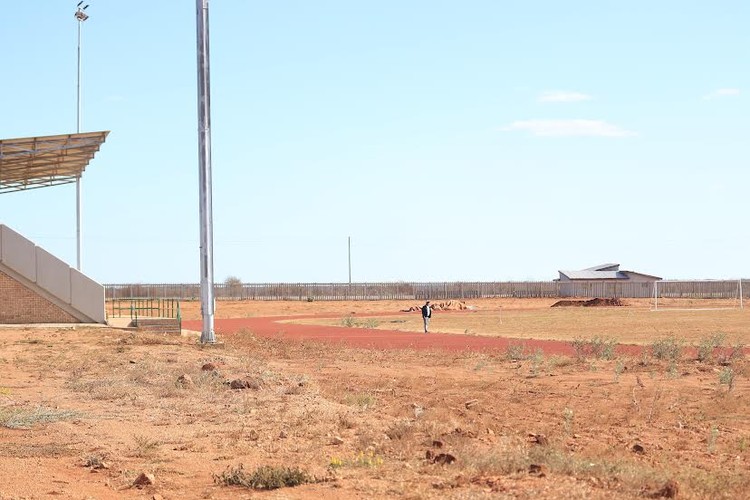
31 October 2024
The R37-million Vhuilafuri Stadium in Limpopo, was due to be finished a year ago. Photo: Thembi Siaga
More than a year after a R37-million sports stadium, intended to serve the villages in the west of Vhembe, was due for completion, it is still unfinished. One of the reasons given is a lack of water to irrigate the grass soccer pitch.
The tender to build the Kutama Sinthumule Sports Facility was awarded in 2022 to Moswobi Building Construction and Property Developers. The Vhuilafuri Stadium, as it is also known, is about 20km west of Louis Trichardt, in Madabani village. It was planned as a central sports complex for at least 17 villages in the Sinthumule and Kutama areas.
The owner of Muswobi Building Construction and Property Developers, Harold Muswobi, is no stranger to controversy. In 2014, his company, Harold Muswobi Construction, was awarded a R500,000 tender (which later grew to nearly R700,000) to repair the municipal swimming pool in Louis Trichardt. The project became a debacle, with allegations of poor workmanship and delays. Despite various assurances over the years, the pool remains closed to this day.
Whether the Vhuilafuri Stadium will follow the same fate is uncertain. When GroundUp visited the site two weeks ago, no workers were present, and the cleared areas were being overtaken by bush. The running track remained unfinished, and the site appeared dry and barren.
Concerns have also been raised regarding the contractor’s treatment of workers. Reports indicate that some workers were retrenched after being told only a small amount of work was left. One worker, speaking anonymously, said: “We haven’t been paid for six months. When we ask about our salaries, we get different excuses. The contractor claims he is waiting for the municipality to pay him.”
Resident Rudzani Liswoga expressed disappointment at the delay: “We don’t have any proper stadium, and we expect this one to be completed. The youth need a place to gather, as some have turned to alcohol and drugs due to a lack of entertainment.”
On 16 October the mayor of the Makhado Municipality, Dorcas Mboyi, conducted an oversight visit to assess progress.
Local residents urged the mayor to terminate the contract. But the municipal portfolio head, Rachel Raliphada, said the contract should not be terminated until they “see value for the money spent” on the project.
Residents also demanded that workers who were owed salaries ranging from R12,000 to R20,000 be paid.
Muswobi was not present during the visit, but a representative, Erick Tambo, said all outstanding payments would be settled by the end of October.
Addressing the community, the mayor promised that there would be value for money in the project. “We don’t have a stadium we can be proud of, and here, I don’t see value for money.”
Municipal documents indicate that construction of the stadium began in September 2022. The tender was awarded to Muswobi Building Construction at a total cost of nearly R37-million. The project was scheduled for completion within 12 months, by 26 September 2023, and was funded through a Municipal Infrastructure Grant (MIG).
The construction plan includes a football/rugby field, an athletics track, combo courts, a 600-seat concrete grandstand, and facilities for traditional games. The contractor is also responsible for providing a borehole, an elevated tank, and establishing water, stormwater drainage, sewerage, and electrical infrastructure, along with fencing, a guard house and an ablution block.
Asked why the project had been delayed, Muswobi declined to comment, referring GroundUp to his “employer,” the Makhado Municipality’s technical department.
The spokesperson for Makhado Municipality, Mpho Rathando, provided detailed responses, noting that some delays were caused by the ongoing water shortage, which had disrupted construction. He said the municipality had spent R32.3-million and the rest, almost R4.6-million, would be spent on completion.
He said the municipality was revising the maintenance plan because of the water problem.
“The revised completion date will be communicated once the update process is finalised,” he said.
When asked about the delays in payments to workers, Rathando said the municipality paid the contractor for services and did not interfere in the contractor’s internal matters.